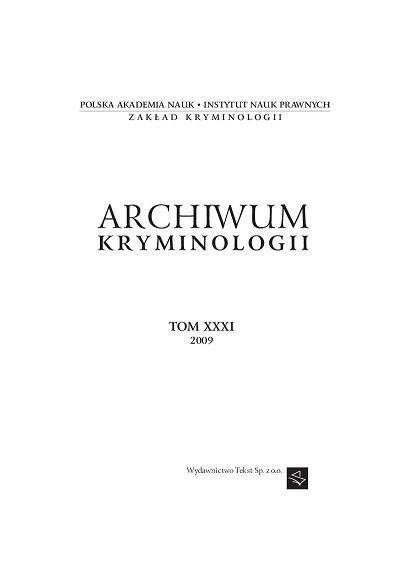System programowanego oddziaływania w opiniach więźniów
The system of programmed influence in the opinions of prisoners
Author(s): Piotr StępniakSubject(s): Law, Constitution, Jurisprudence
Published by: Instytut Nauk Prawnych PAN
Keywords: PROBATION; INCARCERATION; SOCIAL REHABILITATION;
Summary/Abstract: The article presents the results of research on the assessments of the programmed influence formulated by the prisoners. There were a lot of hopes pinned on this system introduced to the penitentiary policy by the Executive Penal Code of 6 June 1997. The system proposed modern educational interactions based on cooperation of the prisoners with the prison staff and assumed active participation of prisoners in its implementation. The key issue of the system is to negotiate the individual schemes and voluntary commitment to respect them by prisoners participating in such negotiations. Enforcing convicts’ activity, particularly the juvenile ones, was supposed to create a chance of individual choice of more efective meaures to influence them and to shape a sense of responsibility – and at the same time to prevernt from return to crime. Since this system came into force on 1 September 1998, now almost 11 years ago, an vital task was to investigate not only the various aspects of its implementation, but also an opinion about this system, formulated by members of the prison community, especially by prisoners. So far there were few empirical studies of this system in everyday prison reality. More extensive research in this field includes studies of A. Nawój and E. Silecka, M. Bramska, A. Kurek and D. Schmidt, and A. Szymanowska. With this as the point of departure, the author of the article carried out a survey in the year 2008 to gather the views of the prisoners about the system and its performance. The study included 540 prisoners selected by the criterion of purpose, and participation in the system imprisoned in facilities subordinate to the District Inspectorate of the Prison Service in Poznan. A survey was conducted from October 2008 to March 2009 in 3 closed units in order to obtain homogeneity of the survey sample. Test groups were randomized. It should be emphasized that the randomisation was made in a way which maintained the proportions between the juveniles and adults indicated above. Surveys with opinions of convicted were supplemented with structured interviews with a group of 30 prisoners selected by the randomization from the group surveyed. Studies have focused on issues such as motives of joining of the criminals to the system programmed interaction, participation of criminals in constructing individual programs of interactions and its determinants, the contents of individual programs, interactions, objectives, tasks, rights and obligations of prisoners, cooperation between the prisoners and their teachers in drafting of schemes. The results of the survey lead to the conclusion that the evaluation of the test by the respondents is generally positive in all the subgroups under study. Nevertheless, the prisoners clearly indicate that the use of this program had a formal, official character.
Journal: Archiwum Kryminologii
- Issue Year: 2009
- Issue No: XXXI
- Page Range: 265-298
- Page Count: 34
- Language: Polish

